One of the problems with running against a historically bizarre opponent like Donald Trump is that there are so many different juicy ways to run against him. Most activists and pundits think of that as an opportunity, but it also poses a very real problem – focus.
Because Trump is such an outrageous cartoon character of a candidate, Secretary Clinton could be tempted to use her campaign platform and resources to frame up Mr. Trump in a myriad of different ways. But that would be the biggest mistake she could make.

Trump the bigot. Trump the philanderer. Trump the misogynist. Trump the bully. Trump the trigger happy. Trump the uncouth. Trump the simpleton. Trump the liar. Trump the inciter. Trump the right winger. Trump the failure. Trump the blunderer. Trump the neo-facist. Trump the war criminal. Trump the con artist. Trump the demagogue. Trump the hypocrite. Trump the rejected. Trump the authoritarian. Trump the unstable. Trump the novice. Trump the flip-flopper. Trump the all-of-the-above.
It’s dizzying. One of the worst possible strategies is the last one — to throw everything at Trump in roughly equal measure, which is de facto what is happening at the moment. And that is what happens when you don’t have a disciplined communications strategy.
Singular Key Message Needed
The essence of communications strategy is sacrifice. You have to walk past some tempting messages in order to have a focused strategy. If you say everything you possibly could say about an opponent, you effectively are saying nothing. All of those very valid Trump critiques piled one upon the other becomes a cacophony to voters. Subsequently, eyes roll and ears shut.
 So communications strategists typically identify a small number of messages or themes that they strive to repeat and stress above all the others. They’re often called “key messages,” or “frames.”
So communications strategists typically identify a small number of messages or themes that they strive to repeat and stress above all the others. They’re often called “key messages,” or “frames.”
The key message is the one idea that you need to stick in your target audience’s mind in order to achieve your goal, which in this case is persuading swing voters to reject Trump and get more comfortable with Clinton.
Therefore, the Clinton campaign needs to stick to a small number of lines of attack, even as the Trump vaudeville act continually tosses out new bait to lead the Clinton campaign down dozens of different messaging paths. Trump is clearly incapable of message discipline, but Clinton can’t allow his lack of discipline to destrory hers.
Trump The Economy Rigger
So which crystallizing key message should Clinton stress?
Swing voters are disgusted by establishment figures like Hillary and Congress, because they see them as part of a corrupt Washington culture that has rigged the economy for the wealthy few to the exclusion of the non-wealthy many. That is the central concern of many Trumpeters and Bern Feelers, and so that issue is the most important messaging ground for Clinton.
Therefore, Secretary Clinton should align a disciplined campaign messaging machine – ads, speech soundbites, policy announcements, surrogate messaging, etc. — around framing Mr. Trump as:
Trump the self-serving economy rigger.
As Clintonista James Carville might say, “it’s the economy rigging, stupid.” That is, Trump the privileged billionaire selfishly seeking to win control the Washington levers of power in order further rig the economy to benefit himself and his privileged class at the expense of everyone else. If this sounds familiar, it’s because it’s precisely the strategy that Team Obama used to defeat billionaire Mitt Romney in 2012.
Why choose this framing over all of the other delicious options? First, it was proven effective against a billionaire candidate in 2016. There is message equity there. Why reinvent the wheel? Second, it goes to the core of what is bugging swing voters the most in 2016.
With this kind of framing, the Clinton-Warren or Clinton-Sherrod Brown team would focus like a laser on Trump’s tax giveaways to the rich. It would highlight his proposals to weaken Wall Street protections. It would stress Trump’s opposition to Clinton proposals to increase the minimum wage hikes and taxes on the wealthy. It would hammer relentlessly on Trump’s refusal to reveal his taxes, and stress that he doesn’t want ordinary Americans to know that the billionaire pays a much smaller percentage of his taxes than they do. It would focus on his history of lobbying to create and perpetuate the wealth-protection measures to rig the economy in his favor, while harming the rest of us.
Executing that kind of messaging strategy would require the Clinton campaign to largely take a pass on the other juicy lines of attack against Trump, all of which will be magnified during daily news coverage, but are unhelpful diversions of public mind space compared to this framing. It would require her to be saying things like this:
“You know, I care much less about today’s latest sideshow than the fact that Mr. Trump’s plan to cut taxes for the rich and oppose a minimum wage hike will further rig the economy for the ultra-wealthy. His outrageous giveaway to his fellow billionaires is much more offensive to me than his latest round of crudeness.”
Focusing on “Trump the self-serving economy rigger” would make Clinton look a bit more like a change-agent, and less like a defender of the despised Washington status quo. It also would help erode the silly notion of among some swing voters that Trump is somehow the champion of the common man.
This won’t come naturally for Secretary Clinton. Her establishment instincts will continually tempt her to focus her critique of Trump through a Washington lens. She’ll instinctively want to crow about the fact that she knows more about policy details, and that the smarty pants Washingtonian centrists, and even some conservatives, are embracing her and rejecting Trump. She’ll want to scold Trump about saying things that, well, refined Washingtonians simply do not say.
Wrong, wrong, wrong. When Clinton does that, many swing voters hear her as “Washington insider looking down her nose at Washington outsider,” and in the current political climate the instincts of many will be to side with the outsider. Hillary needs to fight her instincts and frame Trump as the ultimate nest-feathering insider masquerading as an outsider. She doesn’t need to feel her inner Bubba and triangulate the center right, or jump on each of Trump’s outrage du jour. As much as she may want to resist it, Hillary needs to feel the Bern.

Note: This post also was published as part of MinnPost’s weekly Blog Cabin feature.
Note: Collage portrait by Conor Collins.


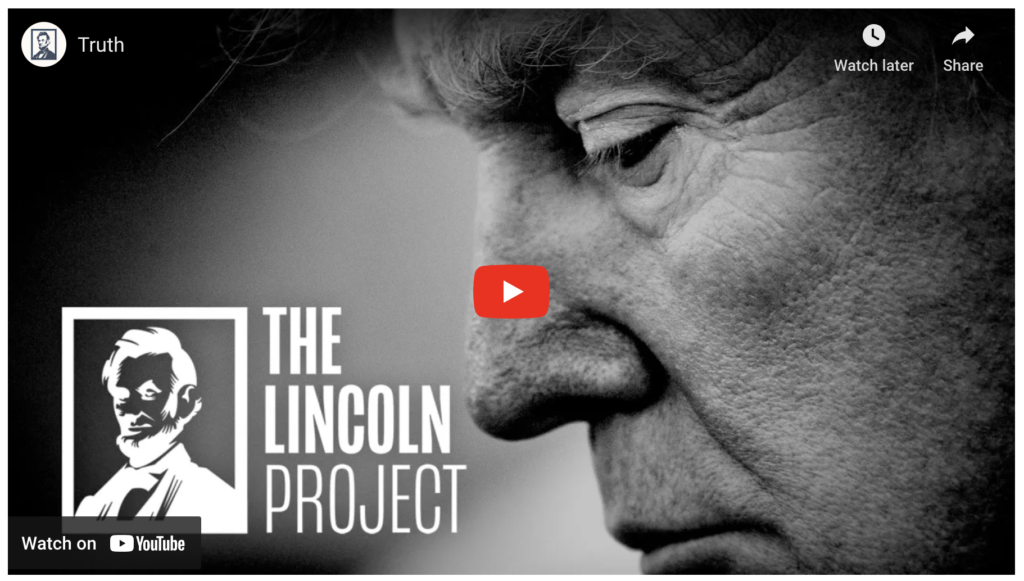
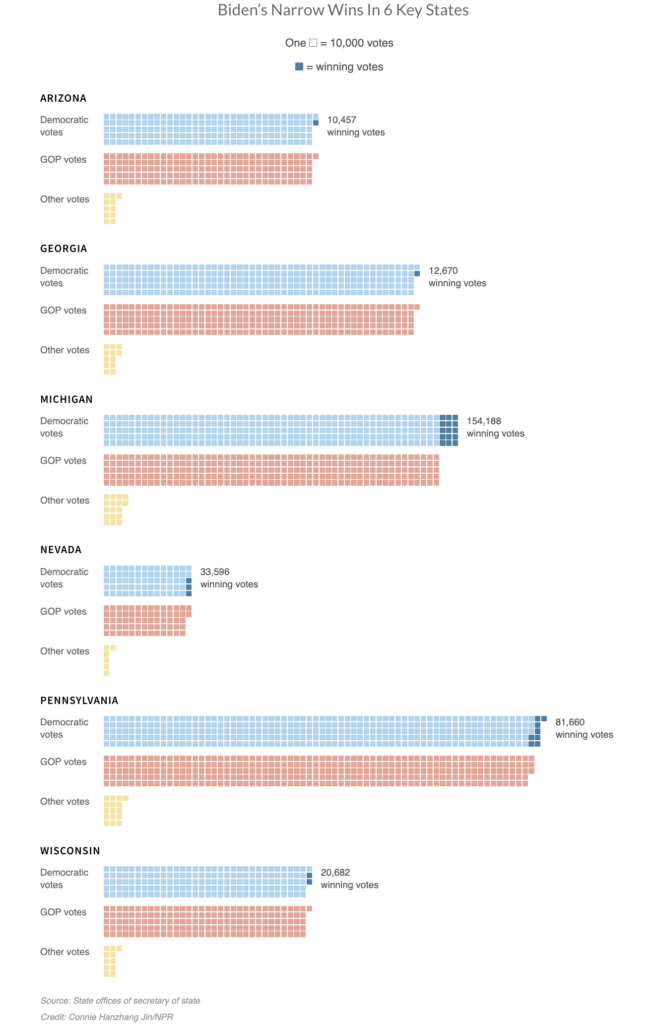



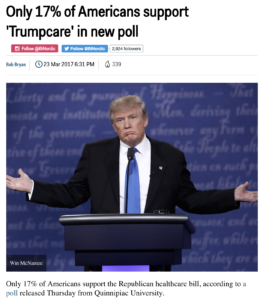 Minnesota gubernatorial candidate Jeff Johnson (R-Plymouth) is crying foul over an Alliance for Better Minnesota television
Minnesota gubernatorial candidate Jeff Johnson (R-Plymouth) is crying foul over an Alliance for Better Minnesota television  On social media and on the campaign trail, I see a lot of self-indulgent, self-righteous scream therapy from the left. There is a lot of snide mocking and scolding of Trump voters. Trump voters are called “stupid,” “naive,” “racist,” and worse. As Trump becomes more untruthful, unhinged and un-American by the day, frustrated progressives lash out with greater ferocity at the 46 percent of Americans who voted for Trump in 2016.
On social media and on the campaign trail, I see a lot of self-indulgent, self-righteous scream therapy from the left. There is a lot of snide mocking and scolding of Trump voters. Trump voters are called “stupid,” “naive,” “racist,” and worse. As Trump becomes more untruthful, unhinged and un-American by the day, frustrated progressives lash out with greater ferocity at the 46 percent of Americans who voted for Trump in 2016.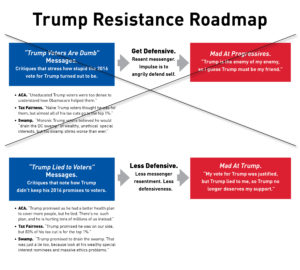 I’m not naive about this. I understand that this messaging nuance won’t persuade every Trump voter. Nothing will persuade Trump voters who are deeply racist, closed minded, or hopelessly brainwashed by the propaganda spewed on Fox News and conservative talk radio.
I’m not naive about this. I understand that this messaging nuance won’t persuade every Trump voter. Nothing will persuade Trump voters who are deeply racist, closed minded, or hopelessly brainwashed by the propaganda spewed on Fox News and conservative talk radio.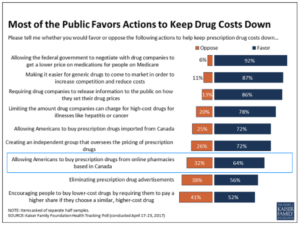 Nearly two-thirds of Americans like this idea. By an overwhelming two-to-one margin, a Kaiser Family Foundation
Nearly two-thirds of Americans like this idea. By an overwhelming two-to-one margin, a Kaiser Family Foundation  Unfortunately, Donald Trump is not on the ballot in 2018. If he was, polls indicate he would get
Unfortunately, Donald Trump is not on the ballot in 2018. If he was, polls indicate he would get  One of the primary rallying cries of the righteous defenders of Senator Al Franken is that he is being “denied due process.” Republican former Governor Arne Carlson was the latest in a long line of folks to make this righteously indignant
One of the primary rallying cries of the righteous defenders of Senator Al Franken is that he is being “denied due process.” Republican former Governor Arne Carlson was the latest in a long line of folks to make this righteously indignant 
 So communications strategists typically identify a small number of messages or themes that they strive to repeat and stress above all the others. They’re often called “key messages,” or “frames.”
So communications strategists typically identify a small number of messages or themes that they strive to repeat and stress above all the others. They’re often called “key messages,” or “frames.”
 Donald Trump and Hillary Clinton are now pretty assured of winning their party’s nomination for president, both because they are far ahead and because it seems unlikely either will implode with their respective bases. They have both had fundamental vulnerabilities exposed, yet they both continue to have a sufficient amount of support to win their nominations.
Donald Trump and Hillary Clinton are now pretty assured of winning their party’s nomination for president, both because they are far ahead and because it seems unlikely either will implode with their respective bases. They have both had fundamental vulnerabilities exposed, yet they both continue to have a sufficient amount of support to win their nominations.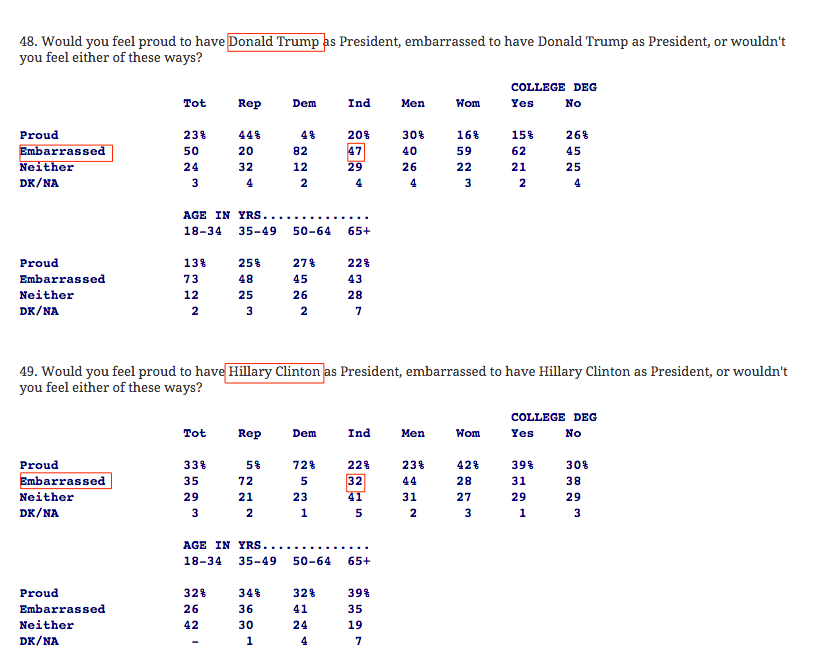
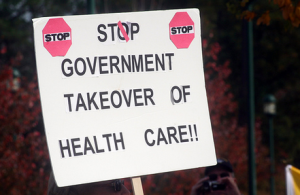 On the heels of the closing of the second year of open enrollment for Obamacare coverage, expect to hear a lot of “government takeover of health care” ranting from conservatives.
On the heels of the closing of the second year of open enrollment for Obamacare coverage, expect to hear a lot of “government takeover of health care” ranting from conservatives.
 One of the things that you can usually expect Republicans to be consistent about is faith in market forces. They’re continually reminding us that we should trust market forces to allocate resources, as opposed to having politicians arbitrarily setting prices and picking winners and losers.
One of the things that you can usually expect Republicans to be consistent about is faith in market forces. They’re continually reminding us that we should trust market forces to allocate resources, as opposed to having politicians arbitrarily setting prices and picking winners and losers.
 But there is at least one policymaking unforced error that is making things a bit more difficult for the DFL — the DFLers authorization of a new Senate office building.
But there is at least one policymaking unforced error that is making things a bit more difficult for the DFL — the DFLers authorization of a new Senate office building. Most voters won’t do a comprehensive financial analysis of whether DFL leaders are doing a good job stewarding their tax dollars. They will judge fiscal stewardship based on an isolated example or two. Republicans are working overtime to make sure that the Senate Office Building is the example voters use to make their judgement.
Most voters won’t do a comprehensive financial analysis of whether DFL leaders are doing a good job stewarding their tax dollars. They will judge fiscal stewardship based on an isolated example or two. Republicans are working overtime to make sure that the Senate Office Building is the example voters use to make their judgement. One of the more brazen political facelifts in recent memory is being attempted in South Dakota, where a ballot crowded with conservatives is causing conservative Senator Larry Pressler (R-SD, 1979-1997) to attempt to convince voters that he is now a moderate.
One of the more brazen political facelifts in recent memory is being attempted in South Dakota, where a ballot crowded with conservatives is causing conservative Senator Larry Pressler (R-SD, 1979-1997) to attempt to convince voters that he is now a moderate.


 Note the tough, no-nonsense daddy image that McFadden’s political consultants are constructing.
Note the tough, no-nonsense daddy image that McFadden’s political consultants are constructing. 
